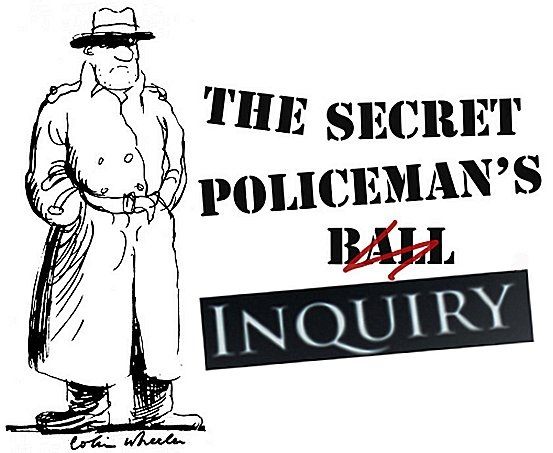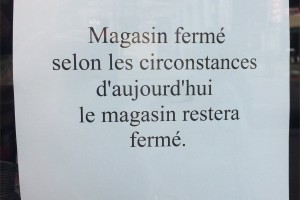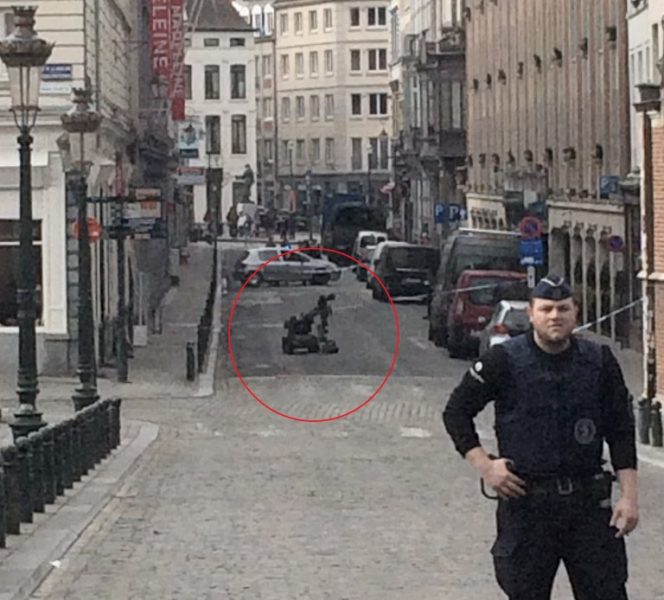Weekly Notes: legal news from ICLR – 25 March 2016
This week’s roundup of legal news and comment concentrates on what’s been happening in the international sphere, from terrorism in Brussels to war crimes in Bosnia, and the targeting of journalists and lawyers elsewhere. But we start with some items from the domestic front. Policing Private hearings of public inquiry The so-called “Spycops” inquiry chaired… Continue reading about Weekly Notes: legal news from ICLR – 25 March 2016
This week’s roundup of legal news and comment concentrates on what’s been happening in the international sphere, from terrorism in Brussels to war crimes in Bosnia, and the targeting of journalists and lawyers elsewhere. But we start with some items from the domestic front.

Policing
Private hearings of public inquiry
The so-called “Spycops” inquiry chaired by Lord Justice Pitchford which is looking into the conduct of undercover police officers opened this week, and almost immediately ran into controversy over a request by the police that parts of it should be held in private, in order to protect the officers whose conduct is being looked into and the techniques used by them.
Theresa May announced the Undercover Policing Inquiry in March last year, saying it would be established under the Inquiries Act 2005 and would
… consider the deployment of police officers as covert human intelligence sources by the SDS, the National Public Order Intelligence Unit and by other police forces in England and Wales. The inquiry will review practices in the use of undercover policing, establishing justice for the families and victims and making recommendations for future operations and police practice.
The judge, or rather chairman, has yet to rule on the application.
Further reading:
- The Guardian, Police try to get parts of undercover officers inquiry heard in secret
- Pitchford LJ opening remarks (July 2015) (PDF)
- Obiter J blog (Law and Lawyers) Undercover Policing Inquiry
[Illustration from Amnesty International’s fundraising events of the 1970s and 1980s, using a cartoon figure drawn by cartoonist Colin Wheeler (of the New Statesman, later The Independent), detourned with some Chilcot lettering.]
Judiciary
Who will judge?
No one, it seems. According to The Times (£), you can’t get High Court judges these days for love or money. There isn’t any money, and they’re feeling rather unloved.
Consider, for example, Sir Richard Aikens’ rather gloomy, almost Eeyoreish remarks in Counsel Magazine earlier this month, as he looked back on his career as a distinguished barrister, judge and eventually Lord Justice:
… as a rule very few decisions of the Court of Appeal are remembered after about five years, and my decisions won’t be any exception…
The very demanding work of the higher judiciary is done despite very little thanks or appreciation from either Government ministers or the higher civil service, who seem to hold the judges in poor regard. In my experience just before I retired, morale in the higher judiciary was at a very low ebb.
He also has some comments on why there might be a candidate gap, when it comes to finding new apppointees:
… the work is getting increasingly harder, there is much more pressure (on judges’ independence apart from anything else), there is less and less support from administrative staff (because of staff and funding cuts) and there has been a cut in judicial pay of over 20% in real terms in the last five years.
According to The Times on Thursday, there are currently 15 posts vacant among the High Court judiciary. The article quoted Sir Richard and other senior retired judges, including Lord Woolf and Lord Phillips of Worth Matravers, commenting on the difficulty of attracting high quality candidates to a post that carried heavier workload and fewer rewards than in days gone by.
However, a Judicial Appointments Commission spokesperson told The Times that
… the quality of applicants was as high as ever. Recommendations for posts have not yet been made so it was not possible, she said, to say how many posts would be filled.”
This suggests that people are not being put off, as the former judiciary maintain, but that there might be a problem selecting good enough candidates. This seems hard to believe. Another explanation may be simple disorganisation and delay in the process of managing the appointments, something the theoretically transparent bureaucracy involved may make inevitable.
The JAC’s website, accessed 26 March, showed under “Senior Appointments – current vacancies” the post of Master of the Rolls. Now I have always fancied this for my own CV, but I will need to get my application in almost as soon as the one for the expiring tax year’s ISA: by the 5 April 2016 to be precise. That’s provided I have already submitted my Notification of intent by 17 March. Damn! Knew there was something I’d forgotten to do. Oh well, there goes my salary of £220,655 and the chance to issue a lot of practice directions requiring judges and litigants to be more helpful to law reporters, notably by supplying a copy of the court bundle for the purposes of fair and accurate and timely reporting of critical precedents. (And none of your data protection drivel, please.)
On a slightly more serious note, the JAC website has quite a bit about about equality and diversity, and I would like to express the hope, not for the first time on this blog, that we might have some more diverse candidates and appointees to the senior judiciary. The development of the common law depends on it, for by diversifying the judiciary who set the precedents we can help prevent the law being ossified.
Terrorism
Brussels bombings: a personal perspective
Having gone to Brussels to attend a one-day conference on Access to and Reuse of EU Legal Information, I was aware even on Monday night that the security forces were on high alert. From my hotel room in the Royal Windsor Hotel in the historic district of Grand Place, I heard the sound of a truck pulling up and barked orders and looked out of my window to see soldiers disgorging from a troop carrier and walking up and down, prodding and inspecting some piles of rubbish on the pavement opposite the hotel, before getting back into the truck, which continued to rev its engines for some time. I began to search for news on the Internet, thinking something might have happened, but the only stories I could find were about the recent arrests and in one case shooting of suspects in the Molenbeek district the previous week.
I'm in Brussels. There's an armed troop carrier revving its engines in the street outside my hotel. Is something going on?
— Paul Magrath writer (@Maggotlaw) March 21, 2016
The following morning, at breakfast, I got a tweet from my colleague Paul Hastings, warning me that something was happening at the airport.
@Maggotlaw – hope all is OK in Brussels, news coming in of issues at the airport….. Take care…
— Paul (@Hasto1) March 22, 2016
A later tweet mentioned explosions at the airport. Other guests at the hotel started to discuss the disruption to their travel plans – flights cancelled. I did not anticipate any problems myself as I was booked to return on Eurostar. It was only later in the morning, having been alerted by several more messages from friends and colleagues, that I learned of the metro bombing and the shutdown of the transport system.

Streets that should have been full of tourists were still fairly full of tourists, wandering around the historic cobbled streets and gilded palaces of Grand Place, or gawping at the statute of the little pissing boy on a street corner. But the shops were mostly closed, and some had notices in the window explaining why. I walked past the Bourse, but people had not yet begun to gather there, as they would later on, chalking messages of peace on the pavement and lighting candles amongst bouquets of dead flowers.
Still labouring under the presumption that I would be able to take the Eurostar, I made my way back toward the hotel. It was now that I noticed all the metro station entrances barred with crime-scene tape, and the uniformed troops patrolling around the central station. Then, as I approached the end of the street, a van approached, wailing its siren, with a phalanx of motorbike outriders, who pulled up not 100 metres from my hotel and started shouting for all the onlookers to move back. There were now soldiers, police and a third force, in a different uniform, deployed in this small town square. From the back of the van they unloaded a thing like a robot. It looked like something out of Star Wars.

Actually, on closer thoughts, it looked just like something out of The Hurt Locker. A bomb disposal droid, caterpillar tracked, with a robot arm, gingerly proceeding along the street towards my hotel. It picked something up. A black bin bag, sagging with unseen contents. Could this be a bomb? It seemed doubtful. How would it be detonated? The droid moved out into the middle of the road, lifted and lowered its robot arm, eventually put the bag down. A man came round the corner and crouched down to inspect it…. Then stood up, made some sort of hand signal, and everyone started moving again.
False alarm. They took the crime-scene tape down and we were allowed back along the street.
In the hotel reception they were shaking their heads. No Eurostar. Oh. Can I check back in, then? (I had checked out earlier, leaving my suitcase with the porter.) Luckily I could. I phoned my wife and explained. I was given a different (slightly better) room and after lunch spent the afternoon working on my laptop. Advice from the British Foreign Office was to avoid crowded places. I had plenty of work to do.
Next morning, the Eurostar services resumed. But the taxi my hotel had ordered failed to arrive. I and another passenger from the hotel had to walk down the street to a public taxi rank to share a cab – at double the normal price – to get to the station. But we were in no position to argue and at least we got there. I made it home.
Bosnia
War crimes conviction
The former Bosnian Serb leader, Radovan Karadžić, has been found guilty of war crimes after a hearing by the International Criminal Tribunal for the former Yugoslavia. Although the acts in question took place during the war in the early 1990s, It’s taken a while for the court to deal with the man dubbed the “Butcher of Bosnia”, because he was not actually captured until 2008, having spent 11 years on the run. He was eventually tracked down, having reinvented himself as an urban faith healer, cloaked and bearded like a Balkan Gandalf, and calling himself Dragan Dabic. (Warlord to warlock, as it were.)
The crimes for which he was convicted include genocide in Srebrenica in 1995, as well as nine other charges, including his actions during the siege of Sarajevo, which left more than 10,000 people dead. However, he was acquitted of one charge of genocide in other parts of Bosnia and Herzegovina in 1992.
He was sentenced to 40 years’ imprisonment, which for a man of 70 amounts to a rest-of-life sentence. Nevertheless, survivors of the atrocities for which he was held responsible and relatives of his victims complained that anything less than a life sentence was an insult.
Sources:
- The Atlantic, Radovan Karadzic’s Day of Reckoning
- Guardian, The hunt for Radovan Karadžić, ruthless warlord turned ‘spiritual healer’
- Guardian, ‘Is the tribunal not ashamed?’ Karadžić sentence angers victims
Hong Kong
Law goes to pot

From his base in Hong Kong, online legal publisher Sean Hocking has just created Your Global Resource on Cannabis Law, Regulation and Cases – the first service to document legal information about cannabis worldwide. According to SLAW, Canada’s online law magazine, for whom Hocking was once a columnist, the general trend towards legalisation of cannabis is moving ever more rapidly and the market needs to be prepared for
… a tsunami of legalisation / legislation with obviously the medical side moving faster than the recreational and the business opportunities are enormous.”
Interesting that he should have chosen to launch such a venture in Hong Kong, where cannabis and many other drugs are seriously illegal. Let’s hope he doesn’t make a hash of it all.
Portugal
Fine for broadcasting trial recordings breached journalist’s human rights
Ms Pinto Coelho, a journalist who was fined for broadcasting unauthorised audio recordings of a criminal trial, took her case to the European Court of Human Rights which, on 22 March 2016, ruled by a 6:1 majority that her rights under article 10 (freedom of expression) had been breached: see Pinto Coelho v Portugal (No.2) (via BAILII [2016] ECHR 296). The sound recordings were from the official tape recording of the proceedings which was available to the parties, but their use in a broadcast had not been authorised. The court balanced the rights of the media to report on a matter of public interest with the interests of the participants, witnesses and judiciary and the necessity in a democratic society to impose restrictions on the use of recordings.
There is a full case comment by Hugh Tomlinson QC on Inforrm’s Blog. He draws attention to the possible significance of this decision on the compatibility of section 9 of the Contempt of Court Act 1981 (which forbids recording of court hearings) with Article 10 of the Human Rights Convention.
Turkey
Journalists tried in secret
The trial of two journalists charged with espionage after reporting on allegations of government involvement in covert arms deals with Syrian rebels, will be closed to public and media scrutiny. The decision has been opposed by Turkish journalists, anti-government activists and foreign governments critics, who reject the notion that the proceedings need to be closed to protect state secrets, and see it instead as a vivid demonstration of a tilt toward authoritarian rule by the government of Turkey’s president, Recep Tayyip Erdogan, according to the New York Times.
Refugee swap deal shunned by UNHCR
The United National High Commissioner for Refugees is not a party to the EU-Turkey deal, and will not be involved in returns or detention, it was announced on 22 March:
UNHCR has till now been supporting the authorities in the so-called “hotspots” on the Greek islands, where refugees and migrants were received, assisted, and registered. Under the new provisions, these sites have now become detention facilities. Accordingly, and in line with our policy on opposing mandatory detention, we have suspended some of our activities at all closed centres on the islands. This includes provision of transport to and from these sites. However, UNHCR will maintain a presence to carry out protection monitoring to ensure that refugee and human rights standards are upheld, and to provide information on the rights and procedures to seek asylum.
Russia/Ukraine
Lawyer found dead
The body of Yuri Grabovsky, a lawyer representing one of two Russian servicemen captured last year in rebel-held eastern Ukraine and now on trial in Ukraine, has been found buried in an abandoned farm, officials said Friday. Two men have been detained in connection with his murder, according to the New York Times.
Amnesty International earlier this week raised the alarm about Grabovsky’s disappearance, saying that he and the lawyer for the other defendant have been under “sustained pressure from the Ukrainian authorities” in connection with their role in the trial.
USA
Terror phone standoff: can FBI hack it?
The police investigating the San Bernardino terror plot may be able to hack into the main perpetrator’s iPhone without the assistance of Apple, who have refused to cooperate by creating a custom operating system incorporating a security “back door” (or skeleton key) because they say such a weak link would compromise security for all legitimate users of Apple devices. (See Weekly Notes – 19 February for background.)
According to the BBC, it is believed a security firm is behind the claim to gain access to the phone without Apple’s cooperation.
That’s it for now. My thanks to all who led me to stories, mostly my followees on Twitter.
This post was written by Paul Magrath, Head of Product Development and Online Content at ICLR, who also tweets as @maggotlaw. It does not necessarily represent the opinions of ICLR as an organisation. Comments welcome on Twitter @TheICLR.